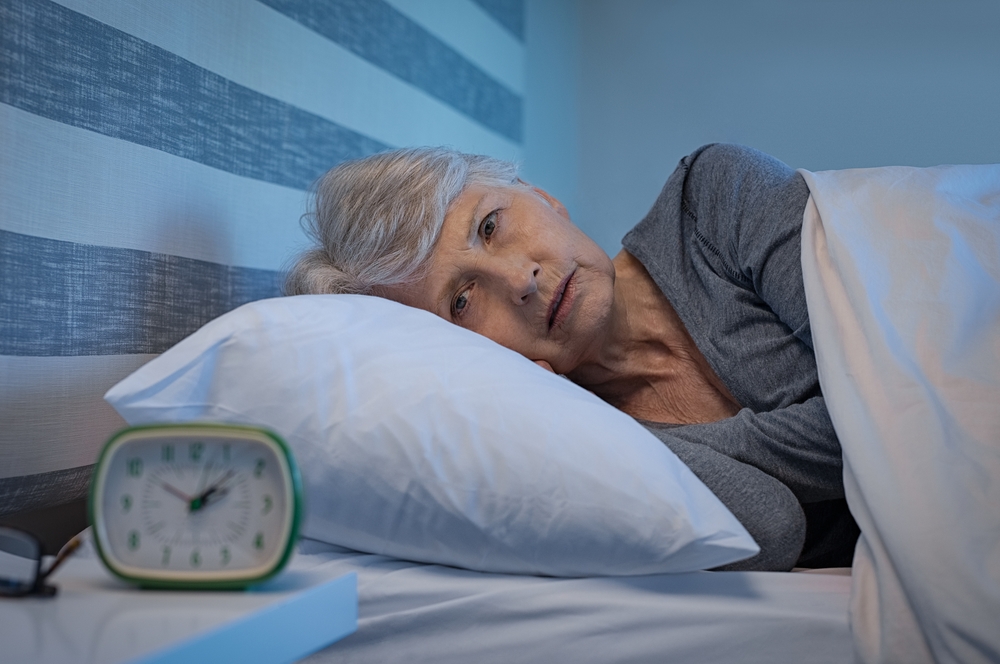

12 Approximately 50% of the patients with symptoms of insomnia will have a remission during the follow-up period, with higher remission rates among older males relative to females. 10 A study of 6,800 older adults (age 65 years or older) observed an incidence rate for insomnia symptoms of 5% per year, 11 with a yearly incidence of 7.97% at 1-year follow-up. Sleep maintenance symptoms are most prevalent among individuals with insomnia (50% to 70%), followed by difficulty in initiating sleep (35% to 60%) and nonrestorative sleep (20% to 25%). 9 Insomnia is often classified by the predominant symptom of either difficulty in sleep onset or sleep maintenance. 6 The overall prevalence of insomnia symptoms ranges from 30% to 48% in the elderly, 5, 7, 8 whereas the prevalence of insomnia disorder ranges from 12% to 20%. 5 Prevalence of insomnia is higher in older individuals than in the younger population. 2 – 4 As many as 50% of older adults complain about difficulty initiating or maintaining sleep. 1 One of the most common sleep disturbances in the older population is insomnia. Something like getting more sleep, switching a medication, or a stress reduction program could get your memory back on track.The population of older adults continues to expand rapidly from the current 205 million persons aged 60 years or older, to a projected 2 billion by 2050. If memory lapses are bugging you, it’s worth a conversation with your doctor to see if any reversible causes are at the root of the problem. Forgetfulness can also be a sign of depression - or a consequence of it.

Both can interfere with attention and block the formation of new memories or the retrieval of old ones.ĭepression. Common signs of depression include a stifling sadness, lack of drive, and lessening of pleasure in things you ordinarily enjoy. Stress and anxiety. Anything that makes it harder to concentrate and lock in new information and skills can lead to memory problems. One drink is generally defined as 1.5 ounces (1 shot glass) of 80-proof spirits, 5 ounces of wine, or 12 ounces of beer. Although "too much" varies from person to person, it’s best to stick with the recommendation of no more than two drinks per day for men and no more than one a day for women. A simple blood test can tell if your thyroid is doing its job properly.Īlcohol. Drinking too much alcohol can interfere with short-term memory, even after the effects of alcohol have worn off. Underactive thyroid. A faltering thyroid can affect memory (as well as disturb sleep and cause depression, both of which can be causes of forgetfulness). (Adapted from Improving Memory: Understanding age-related memory loss, a Harvard Medical School Special Health Report) Loratadine (Claritin) or other non-sedating antihistamine Other medications for an overactive bladder, such as trospium (Sanctura), solifenacin (Vesicare), or darifenacin (Enablex)Īmitriptyline (Elavil), desipramine (Norpramin), or nortriptyline (Aventyl, Pamelor)Īnother type of medication, depending on why your doctor has prescribed a tricyclic antidepressant (neuropathic pain, depression, etc.)Ĭold or allergy medication containing brompheniramine, chlorpheniramine, or diphenhydramine Oxybutynin (Ditropan) or tolterodine (Detrol, Detrusitol) Medications that may affect memory and possible substitutesĪsk about switching to one of these drugsĪnother antidepressant such as fluoxetine (Prozac) or sertraline (Zoloft), or a different type of antidepressant such as duloxetine (Cymbalta) or venlafaxine (Effexor)Ī different type of heartburn drug, such as lansoprazole (Prevacid), omeprazole (Prilosec), or esomeprazole (Nexium) As shown in the table below, alternatives are usually available. Talk to your doctor or pharmacist if you suspect that a new medication is taking the edge off your memory. That can make it difficult to pay close attention to new things. Medications. Tranquilizers, antidepressants, some blood pressure drugs, and other medications can affect memory, usually by causing sedation or confusion. Too little restful sleep can also lead to mood changes and anxiety, which in turn contribute to problems with memory. Lack of sleep. Not getting enough sleep is perhaps the greatest unappreciated cause of forgetfulness. But there are some treatable causes of forgetfulness. When they happen more than they should, they can trigger fears of looming dementia or Alzheimer’s disease.

Memory slips are aggravating, frustrating, and sometimes worrisome.


 0 kommentar(er)
0 kommentar(er)
